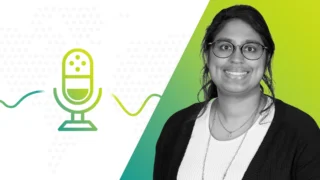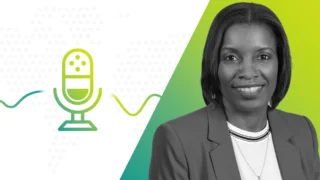This article originally appeared in the CIA (e)Bulletin.
This is a transcription of a recent Seeing Beyond Risk podcast interview where François Cloutier, Vice-Chair of the Research Council, spoke with President Marc Tardif. The podcast, conducted in French, is also available in the iTunes store and on Spotify.
François: Hello, and welcome to Seeing Beyond Risk, a series of podcasts presented by the Canadian Institute of Actuaries. My name is François Cloutier and I’m Vice-Chair of the CIA Research Council. Today we have the pleasure of talking with the new President of the CIA, Marc Tardif, who will fill us in on his plans and objectives for the coming year. Hello Marc, and thanks for joining us on this podcast.
Marc: Thanks, François. Always a pleasure.
Q: Marc, now that you’re President of the CIA, what are your three main objectives?
A: Well, one of my hopes is to convince every actuarial student planning to pursue a career in the field to join the CIA. In writing their exams, they’re exposed to either the Society of Actuaries or the Casualty Actuarial Society, but I want them to know that in my opinion, the CIA will support them best and represent them when they embark upon a career in Canada. Not only that, but the CIA makes sure that the Associate or Fellow designation is accepted in other countries, including the United States, Great Britain, France, and Australia. And I hope that Canadian actuaries who have yet to join our ranks reconsider their decision. We would be happy to welcome them.
My second priority is to encourage more actuaries to volunteer. We have some excellent volunteers, nearly 500 by my count, but there are some 800 positions in all. This doesn’t mean there are 300 vacant positions. Rather, many volunteers are working more than one position. And I can’t thank them enough. The thing is, though, volunteering for the CIA is really gratifying, so I’d love it if more members stepped up to the plate and volunteered. I’m appealing to all our members from every age group, but especially our younger members who may find it intimidating to join long-standing committees or councils. Those in charge are ready to welcome them and make them feel at home. We’re also forming task forces with shorter mandates – three to six months, for example – and focusing on more narrowly targeted issues. This may appeal to members who don’t want to commit to a two- or three-year committee mandate but who do want to volunteer their time all the same.
Last, but not least, my third objective is to take a page from other organizations and expand the employment opportunities for our members in Canada and internationally while continuing the excellent work done by our Public Affairs Council in promoting the profession to a wider audience. Just recently we expressed our opinion on the possibility for Canadians to retire a bit later. We just submitted to our members a draft position on the financial risks of climate change. These and other positions show the public at large that actuaries can contribute in less traditional fields. Internationally, we meet regularly with the actuarial associations of the United States, Mexico, Great Britain, France, South Africa, Australia, and others. We exchange ideas with them on such topics as training, areas of practice, our successes, and even our failures. We show them that the training we require of our new members and the continuing education we require of veteran members are truly relevant. Consequently, these associations should be prepared to hire CIA members for positions in their territory. So, there you have it: my three main objectives.
François: Thanks, that’s great. Basically, I see these three objectives taking the CIA to another level and allowing us to focus more on relevant issues. Marc, how did your year as President-Elect go? How did you prepare for your term as President?
Marc: I think I’ll answer your second question first, if that’s OK. I’d say that I actually started preparing a few years ago, when I went to the Board meetings. At the time, I chaired the Member Services Council. Like all council chairs, I didn’t have voting privileges, but I watched how the council operated. After that I was elected Director and I spent another three years at the council. I still had things to learn, it seems. I had to delve deeper.
During my year as President-Elect, I assisted the President and observed him very closely. I also met with representatives of several international associations. My year as President-Elect was very active: in addition to the Board meetings I mentioned earlier and the international meetings, I tried to attend a number of meetings of the six councils. The President-Elect is also called on to meet with actuarial clubs. I toured cities from west to east: Calgary, Winnipeg, Waterloo, and Toronto. I haven’t forgotten Québec City – my visit there has been postponed, likely until the fall. And I just learned a few days ago that London has just been added to the list.
I’ve met a lot of very dynamic young actuaries, and I think the profession remains in very good hands. I also represented the CIA at the Actuarial Students’ National Association [ASNA], an organization that impressed me greatly. While there, I met the President-Elect of the Society of Actuaries, and he too impressed me a great deal.
François: That’s great, Marc. You mentioned that the CIA maintains a relationship and dialogue with other actuarial associations or entities around the world. How would you characterize our relations with those associations or institutes, such as the SOA, CAS, IFoA, and so forth?
Marc: That’s a good question, François. Obviously, we deal much more with the SOA and CAS. We deal with them very regularly, in fact, and our relations with both are excellent, I would say. For example, we are very gratified that the CAS accepted our university credit system a few years back and remain hopeful that the SOA will follow suit one day. I understand that it’s difficult for them. Accepting our system poses certain problems for them, but we still hold out hope that they’ll be able to one day. Also, we asked both organizations, which supply us with exams, to develop the material we’ll need to provide proper training to deal with IFRS 17, and both were very responsive – this despite the fact that in the US, IFRS 17 won’t apply as much as it will in Canada. As for the IFoA, the organization in Great Britain, we share educational materials with them and participate in joint research efforts. Our relationship with them is very good. We meet with them at least twice a year. I think I touched earlier on the bilateral meetings we hold twice a year with international actuarial organizations, such as those in France, Australia, South Africa, and Mexico. And I mustn’t forget the International Actuarial Association, where CIA members are very active, as evidenced by the fact that Canada was able to place a member, Dave Pelletier, on the working group tasked with studying the proposed IAA reorganization. In my opinion, this proves that the association considers that Canada has an important role to play, and that’s great.
François: Nice. I’ve noticed that you’re very present on LinkedIn, where you publish and share various content. Will the CIA maintain a larger presence on social networks or media in the coming weeks and months? And if so, on which platform and to what end?
Marc: That’s a bit of a tricky question. My personal involvement on LinkedIn… First of all, we’re better known on social networks, like Facebook, Twitter, and LinkedIn. Personally, I’ve only joined LinkedIn in a professional capacity. And since I’ve become involved with the Board and more recently the presidency of the Canadian Institute of Actuaries, I’ve taken the opportunity to tout our volunteers’ success and highlight subjects of interest to our members. I’m trying to weigh in on an ad hoc basis to highlight these things and show what our members are doing and what the Institute is publishing and sharing. I too find it interesting, and I think we’re doing some good work. So that’s pretty much what I’ve been up to on that end.
François, you asked whether the Institute will increase its presence on social networks. As I said earlier, I’ve been participating in Board meetings for five years now, and once or twice – if not more – a year we receive reports detailing the CIA’s activity on the various social networks. The Institute maintains a presence on Facebook, Twitter, and of course, LinkedIn. As I said, personally I participate only in LinkedIn, so this is the only activity I see directly on my phone or computer. But the reports I receive as a Board member tell me that the Institute is very active on the other two platforms I mentioned, and possibly some others that I’m personally less familiar with. Now, I also know that our communications service is in very good hands. It was led by Les Dandridge until very recently, but Les is retiring. It will now be led by Sandra Caya, and Sandra is very active and involved in these social networks. So, I think that the Institute is going to be very active in this area, probably more than ever before.
François: Thanks Marc. In your view, what are the biggest challenges facing the profession and actuaries as things stand today?
Marc: In the early 2000s, the life insurance industry became very consolidated. In my view, P&C insurance has yet to see this level of consolidation. Maybe it will, and maybe it won’t. I hope not, because that would mean fewer positions. But we also know that fixed benefit pension plans, for example, are less and less popular. Although the existing plans will continue for a number of years, there will eventually be fewer positions in this sector.
This is offset somewhat on the insurance side, because the valuation model, the pricing, and the models for calculating the required capital are increasingly sophisticated and complex and seem to require more actuaries. The insurance transition period we’re seeing now with IFRS 17 will surely require more actuaries. And this should last for a few years. Eventually, some positions may disappear, but it’s up to us to keep showing the public that actuaries can play a larger role in traditional sectors, yes, but also in sectors where we have less of a presence.
The CIA will continue promoting the profession and ensuring that the initial training and continuing education offered to members will enable them to fill these new positions. I’m thinking here of predictive analytics, for example. This is a field where actuaries are very involved in their industry, but we’re hopeful they’ll get involved as well in non-traditional areas. And we’re seeing some success. We’ll do everything we can to build on this success. There is also risk management, which has been around a bit longer. We’ve built capacities in this area, and we’re trying to ensure that actuaries play roles in non-traditional sectors. It will also be necessary to adapt to artificial intelligence and the disruptions it will cause in all fields, including our own. But disruptions also create opportunities. It will be up to us as an Institute to ensure that the training we offer our members enables them to successfully navigate these disruptions and face the music.
François: Yes, I think that’s the right way to look at things. I’d like to turn now to something a bit more general. It’s often said that retirees are busier than when they were working. Is that true in your case, Marc?
Marc: Well, having agreed to assume the role of President of the CIA, which involves a three-year commitment, I have to say that this has taken up any idle time I might have otherwise had. I’m very involved, and it’s pretty time-consuming. Now, apart from that, sure, we’re travelling a bit more and there’s no shortage of things to do around the house. I’ve started exercising a bit more and I’m training two or three times a week. Let’s just say that the days go by fast. Maybe not as fast as when I went to the office every morning, but I’m never bored.
François: Yes, I hear you. Anything you’d like to add as a closing remark?
Marc: In almost every presentation I deliver, be it at an actuarial club, ASNA, the various associations and meetings and, for example, the conference I was at in Montréal last week [act19], I always close with the same message. I want Canadian actuaries to feel at home in the Canadian Institute. I want them to feel involved. I want them to find challenges that they can volunteer for. And I want them to see opportunity. I’m also prepared to listen to these actuaries if there are things they want to discuss, questions they want to raise, or views they want to express. We’re available, and we want their feedback.
Just like with any corporate executive or management situation, we can’t guarantee we can listen to every single thing our members say, but the more feedback we get, the easier it is for us to take the pulse of our organization. So, feel free to contact me personally, or contact the Board or Head Office. We’ll listen to what you have to say, and we’ll see what we can do. But bottom line? I need new volunteers to step up. We need more and more volunteers. There are more and more challenges to be met, and the more ideas we’re presented with, from a variety of age groups, the easier it will be for us to steer our organization in the right direction, with the help of everyone’s input.
François: I think that’s a great way to wrap up today’s podcast. Thank you so much, Marc, for taking the time to share your thoughts with us today.
Marc: Thanks François. It was a pleasure to fill you in on what’s going on in my head.
François: On behalf of the entire CIA membership, I wish you every success in your endeavours as President of the Institute.
Marc: Thank you.
My name is François Cloutier and thanks for listening to Seeing Beyond Risk.





